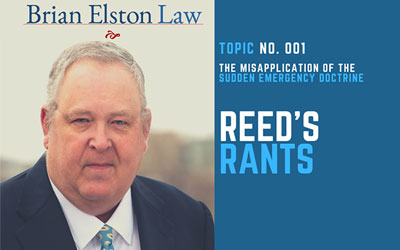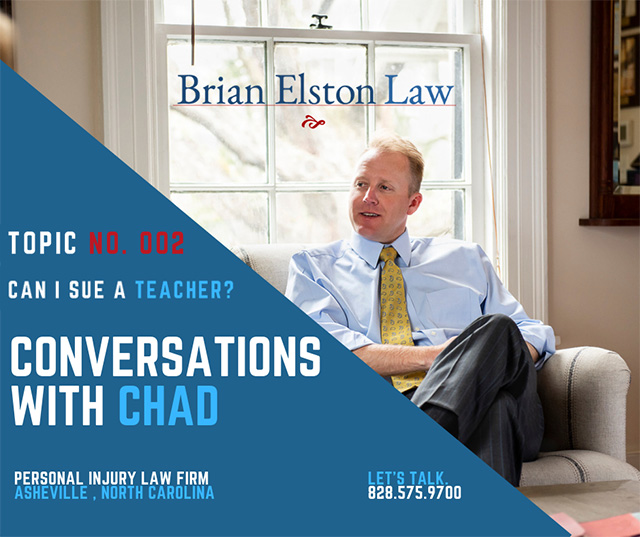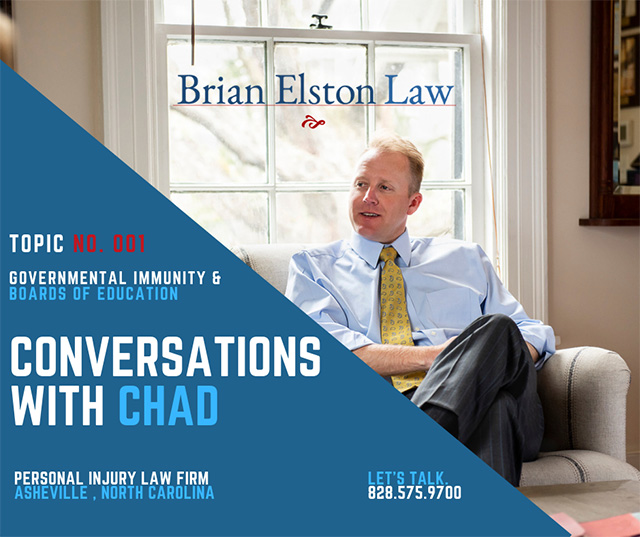No Results Found
The page you requested could not be found. Try refining your search, or use the navigation above to locate the post.

Someone injured in an accident because of someone’s negligence has the right to know what they can expect in terms of justice. The individual’s life has likely been turned upside
down, so they want to know, what can they expect?
I get it. I’ve resolved countless motor vehicle accident, personal injury and workers’ compensation cases. Each case has some of the same components, but their values are different. Think of it like music bands. Most bands are playing the same instruments, but the Dave Matthews Band is a lot different than Weezer.
Each personal injury claim is generally comprised of the same components in determining its value.
All bands are known for their front man, and each case is about who the client is. A mentor of mine once said that Exhibit 1 is the client.
Who the client is, where are they from, their professional (and even criminal) background, work experience, family support, and medical history are all significant in evaluating a claim. How will the client appear in front of a jury?
As a personal injury attorney, we work to put the best foot forward for our client. In settlement discussions, we usually send a picture of the client so the claims adjuster is aware that they are a “face, not just a case.” In preparing for depositions, we meet with our clients several times to prepare them.
Medical treatment in a claim is like a guitar solo in a Led Zepplin song. It’s got to have one and it should be continuous.
There is a correlation between medical treatment and a case’s value. The insurance adjuster’s processes and systems all factor in the amount of medical treatment, and, with some exception like a wrongful death case, they equate more medical treatment with the severity of the injury. Moreover, a juror will value a surgery higher than an office visit.
As stated above, the medical treatment has to be continuous like a solo. Lapses in treatment without explanation impact the value of a claim.
In evaluating a client’s claim, our firm collects all medical records associated with the accident, which can be no easy task. One trip to the emergency department usually generates four separate records by the ambulance, hospital, radiologist, and emergency room physician. We review each record, dissect them for recording accuracy, summarize, and compile them for the insurance adjuster. Our job is to help explain the extent of medical treatment and causation.
I know the bass player in the band Bush. At his wedding, a bandmate of his said that no one ever misses the bass, until its not there. At a concert in Germany, the bass player inadvertently spun around and in doing so, kicked the connection between the bass and the amp. Apparently, everyone knew that the song was missing something.
Like the bass, insurance adjusters want to know the amount of the medical expenses. The adjuster knows that this is the amount that they are responsible for if they are found liable and there is causation. So, they want to know what they are looking at.
As I addressed in a prior blog post, a claims value is not based on a multiplier of the medical expenses. However, they are an anchor.
Brian Elston Law contacts not only the medical providers in order to determine their bills, but also health insurance companies to determine what, if any, amounts were paid to satisfy the bills. Brian Elston Law is able to assist in resolving your personal injury claim.
More on the band and its roles & beats in part two of this personal injury claim Band Part ll – stay tuned for Topic 003 !
– Brian

Brian Elston Law specializes in settlement negotiations with claims adjusters. Our attorneys have resolved hundreds of personal injury claims and recovered millions of dollars on behalf of their clients.
It was sixth grade and, for the first time, there was going to be a school dance. I was looking forward to it, but was feeling nervous and intimidated. Yes, I could “Jump” to Kriss-Kross, but that was the extent of it. So, I listened to music, watched MTV (they played music back then), and tried to practice in front of the mirror. My older, and much, much cooler sister heard what was going on. I showed her my moves, and despite the fact that she could have absolutely destroyed my confidence, gave me a couple of pointers and expanded the repertoire by adding some moves (e.g. Roger Rabbit and Running Man). When I went to the dance, wearing my best sweater, I was able to break it down to all the songs and had a great night.
If you never done it before, engaging in direct settlement negotiations with a claims adjuster can be as intimidating as a sixth-grader going to their first dance. You’ve probably (and hopefully) never had to settle a personal injury claim, so you aren’t sure of what moves to make, the tone of the conversation, and what to do.
In my first blog post, I’m going to lay down the beat about settlement negotiations with a claims adjuster.
The most important thing about dancing, and engaging in settlement negotiations, is to know the individual across from you. Settling a personal injury claim is a process, and you should get to know the claims adjuster. Are they a “just the facts ma’am” or are they chatty? Have they been a claims adjuster since the dawn of time or is this a new career? Do they have compassion fatigue or are they sympathetic? More importantly, how do you interact with each different personality type? You don’t want to step on your partner’s shoes when negotiating, so you’ve got to know their style.
Jonathan Farrington wrote a great article on negotiating with the four personality types, the Director, he Socializer, the Supporter, and the Clinician.
As a personal injury attorney, fortunately, we get to work with many of the same claims adjusters. I know what they need and don’t need in order to evaluate a claim. I know if they prefer email or telephone. More importantly, I’ve built a relationship with them, so there’s a level of trust already in place.
I think that when people hear “settlement negotiation” they think of on-the-spot come-backs, boileroom pressure, and yelling in a phone until you get what you want. No. Settlement negotiations are a process and you’ve got to prepare from the beginning.
For instance, you’ve got to look at all the factors that comprise the value of your claim. You’ve got to compile medical records, bills, and even asking medical providers if there is any future treatment you may need.
Long gone are the days of just asking for 2 or 3 times medical bills. Using that approach today is like doing the Macarena to the new Post Malone. The claims adjuster will know you are out of style and know they have the upper hand.
In order to evaluate a claim, I’ll spend hours going over medical bills, records, opinions, lost wages, reviewing the accident report, property damage claim, and any other document relevant to the claim. Then, before even speaking with the adjuster, I’ll collect my thoughts and figure out my approach. I want to be sure that my moves are on-point and am prepared.
When you have all your claim documents, figured out your strategy and approach, then it’s time to negotiate. Negotiating should not take place while grocery shopping at Ingles, when you have a car full of kids, or when you just wake up. You should be in a place where you have a clear phone connection, documents in front of you, and mentally and physically ready to negotiate. In other words, you should be the one to let the beat drop.
In one particular case, an adjuster called a client first thing in the morning and soon after the accident. Still groggy and on pain-meds, the client agreed to the adjuster’s offer. He came to see me afterwards. I was able to increase the offer based on some things that were not considered, but the deal had essentially been made.
If a claims adjuster calls you, and you are not ready to discuss the claim, schedule a time to call them back. You can decide when to let the beat drop.
As a personal injury attorney, I will schedule a call, set up a voluntary mediation, or even catch up with the other attorney over coffee to discuss. In each scenario, I want to be sure that I am ready and not caught off guard.
Just like a middle-school dance, engaging with settlement negotiations with a claims adjuster for the first time can be nerve-wracking, intimidating, and awkward. In order for settlement negotiations to go smoothly, you’ve got to know the claims adjuster, prepare for negotiations, and resolve the matter at the right time.
Fortunately, engaging in settlement discussions with claims adjuster is not the first dance for the attorneys at Brian Elston Law. Our attorneys have resolved hundreds of claims and recovered millions of dollars on behalf of their clients. Our attorneys know when and how to negotiate to provide each client with maximum justice, and minimum stress.When it’s time for the big dance, Brian Elston Law is able to assist in resolving your personal injury claim. – Brian
The page you requested could not be found. Try refining your search, or use the navigation above to locate the post.

It seems like there is one household rule that is universal to all families: don’t play ball in the house. When playing ball in the house, it’s only a matter of time before a window breaks, a lamp is knocked off a table, or a picture frame is busted. No matter who threw the ball, or who didn’t catch it, both parties should fix the broken window.
LET’S TALK.
828.575.9700
In today’s world, I see “the sudden emergency doctrine” pop up as a response by a defendant, I’m a bit chagrined. Using the baseball-through-the-windowanalogy, defendant’s try and blame the throw or the bad catch as the emergency. However, that “emergency” wouldn’t have happened had they simply followed the rule of no ball in the house.
The Court’s agree. For instance, in Banks v. McGee, 124 N.C. App. 32 (1996) a defendant lost control of her car after hitting a puddle of water. When she hit the water, she started to hydroplane, skidded into another lane and hit plaintiff’s car. The defendant’s plead the doctrine of sudden emergency as a bar to plaintiff’s action. The Court of Appeals disagreed. The Court reasoned that it wasn’t a sudden emergency because the defendant was aware that it was raining and knew that rain puddles on the road she was traveling. The question is now what she saw, but instead what a reasonable person in her situation should have seen. The court has used the same reasoning when defendant’s vehicles have lost control due to hitting a an icy patch of road, when they knew that the snow on the road would turn to ice. (Sobczak v. Vorholt, 181 N.C. App. 629 (2007). In short, the defendants want the doctrine to apply simply if there existed an unanticipated event not created by the negligence of the defendant. However, that application fails to take into account whether or not a defendant should know that an emergency should, or is likely to, occur.
As a personal injury attorney, nothing frustrates me more than to see the misinterpretation of the sudden emergency to get out of paying for the window. It causes all parties more time and expense, instead of just accepting responsibility. – Reed

Students get hurt at school for various reasons. Sometimes, those reasons are nothing more than an unavoidable accident with no one to blame. Sometimes, however, those reasons might have something to do with the actions (or inactions) of your child’s teacher. In these situations, typical legal claims against teachers include negligence and negligent supervision.
1) can I sue a teacher on behalf of my child; and
2) even if I won a lawsuit, would I collect anything?
LET’S TALK.
828.575.9700
In North Carolina,
for all legal matters involving minors, the court
requires a Guardian
ad Litem (“GAL”)
The short answer is “yes”. If a teacher did something (or failed to do something) that caused harm to your child, then, depending on the facts and circumstances, it is possible that the teacher engaged in negligent behavior and could be sued in state or federal court.
In North Carolina, certain categories of governmental employees are entitled to public official immunity. This simply means that if their actions were not malicious, corrupt or outside the scope of their official duties, these employees cannot, at a matter of law, be liable for their negligent behavior. In the school system context, employees with public official immunity include school board members, superintendents, directors and principals. Teachers, however, are not entitled to public official immunity and can be liable for their negligent actions.
It’s not a secret: teachers are overworked and underpaid. Even if you did win a lawsuit against a teacher, like most people, teachers probably will not have the financial resources to pay the judgment. However, since 2012, the State of North Carolina has provided professional liability insurance for all public school employees, including teachers, who are sued in their individual capacity (the “NC Insurance Policy”). If the teacher’s actions are not malice, corrupt, illegal or outside the scope of employment duties, the teacher will have insurance through the NC Insurance Policy that could be used to satisfy a judgment or to settle a claim.
Respondeat superior means “let the master answer”. This is a common legal principle that means employers can be liable for the actions of their employees. In the school system context, if a teacher engages in a negligent act that harms your child, you can sue both the teacher and the board of education since the board is the teacher’s employer. In certain circumstances, the teacher may have insurance through the NC Insurance Policy and the school board may have insurance through another, separate insurance policy. In this circumstance, there is potentially two pots of moneys that can be used to pay a judgment or settle a claim. For more information concerning suing boards of education, check out Conversations with Chad #1 – Governmental Immunity and Boards of Education.
In North Carolina, for all legal matters involving minors, the court requires a Guardian ad Litem (“GAL”). The GAL is a courtapproved, third-party that is solely responsible for looking out for the minor’s best interest and makes reports to the judge. In all matters involving monies going to a minor, all settlements must be approved by a judge. Any proceeds from a settlement or judgment will be held in trust by the clerk of court until the minor turns 18 years old.
Obviously, suing your child’s teacher is a major decision that requires a lot of thought. It can be a long, stressful process; however, it may be the last and most appropriate way to advocate for your child’s interest.

This “Conversations with Chad” deals with how governmental immunity impacts suing a board of education. As anyone who has ever stood in line at the DMV for two hours can tell you, most anything involving the government is never easy. Trying to get a governmental entity to give you money to compensate you for its wrongdoing is particularly challenging.
This old doctrine dates back many centuries ago to England and stands for the premise that
even if he did something wrong, the king should not have to pay money judgements to compensate his subjects. Obviously, North Carolina isn’t a kingdom and the Governor isn’t a king; however, this old English doctrine, known as “governmental immunity”, is still alive and well in our State.
LET’S TALK.
828.575.9700
When analyzing a potential legal claim against a board of education, there are several things to consider.
Generally, when boards of education are engaged in governmental functions,
they are entitled to governmental immunity for tort and negligence-based actions. Governmental immunity does not apply if: a) the board of education is engaged in a proprietary function (i.e., performing a function not historically provided by the government that could be provided by a private business or corporation); b) for breach of contract claims; or c) for violations of state/federal constitutional claims.If a board of education is engaged in a governmental function (a likely event for most school systems) and the board of education has not otherwise waived its government immunity, it will not liable for tort or negligence-based actions.
A board of education waives its governmental immunity for tort and negligence-based actions when it procures insurance through a company or corporation licensed and authorized to issue insurance in North Carolina. Governmental immunity is waived up to the amount of insurance purchased and only for those things covered by the insurance policy. For example, if the board of education’s insurance policy limit is one million dollars, a plaintiff will only be entitled to collect up to the policy limit. The board of education retains its governmental immunity for damages in excess of the policy limit.
A minority of boards of education across of North Carolina, particularly in larger, urban districts, have waived their governmental immunity through the purchase of commercial insurance.
Most boards of education in North Carolina are members of the North Carolina School Boards Trust (“Trust”). Understanding what the Trust covers can be complicated. Essentially, the Trust operates like a risk pool and participation in the Trust is not considered the purchase of insurance and does not waive governmental immunity.
The Trust itself provides $150,000 in “coverage” for each member-board of education. Remember, however, that this “coverage” is not insurance and the board of education has not waived its governmental immunity. This “coverage” is mostly for issues that do not pertain to claims subject to governmental immunity (i.e., employment claims, breach of contract, proprietary functions, etc.). In a garden-variety negligence case, if a student is injured and the student’s forecast of damages is below $150,000, the board of education retains its governmental immunity and is not liable for anything.
As a member of the Trust risk management program, however, member-boards of education also purchase excess insurance up to $850,000. The excess insurance is commercial insurance and is a waiver of governmental immunity. The easiest way to explain this is through the following hypotheticals:
Hypothetical #1. During recess, John, a six-year old student, is injured on the school playground. It is undisputed that John’s teacher failed to provide adequate supervision while he was on the playground. Through respondeat superior, the board of education is sued for negligent supervision and at trial, John is awarded a judgment in the amount of $275,000. Because the board of education is a member of the Trust, John’s recovery is limited, however, to $125,000. Remember, the board of education has retained its
governmental immunity for the first $150,000. The board of education’s liability for damages does not begin until the judgment triggers the excess insurance policy.
Hypothetical #2. Same facts as Hypothetical #1 except John has much more severe injuries and at trial, wins a judgment in the amount of $1,500,000. John’s recovery will be limited to $850,000. He is not entitled to the first $150,000. He is entitled to the full amount of excess insurance; however, once the damages exceed the excess insurance policy limit, the board of education retains its immunity because it no longer has insurance.
Based on how the Trust operates, it is not unusual for the board of education to file a motion for partial summary judgment for the first $150,000 of any potential recovery based on governmental immunity. It is important to carefully explain this concept to clients to manage their expectations. Depending on whether the board of education has insurance or is a member of the Trust can be a critical distinction in a damages analysis. An identical claim might be worth $300,000 in one school district but only $150,000 in a neighboring school district.
In their respective policy manuals, almost all boards of education have policies dealing with limited claim settlements for lawsuits. This is especially true for boards of education that use the Trust. While boards of education will occasionally voluntarily waive their governmental immunity to settle cases, it is not a common practice and generally reserved for small claims. In order not to run afoul of the Fourteenth Amendment and the Equal Protection Clause, boards of education must make specific findings for each case in which it voluntarily waives its governmental immunity to settle a claim.
Under NCGS 115C-524, boards of education can enter into agreements allowing non-school groups the right to use the school system’s real and personal property (e.g., an AAU
basketball league can use the school gym for a weekend basketball tournament). If the board of education follows its internal rules and regulations and enters into an agreement with the non-school entity, no liability shall attach to the board of education for personal injury suffered by reason of such use.
Whether you like it or not, with respect to boards of education, governmental immunity is the current law of the land. Understanding what the law is and how it works in practice is critical when analyzing lawsuits against boards of education.